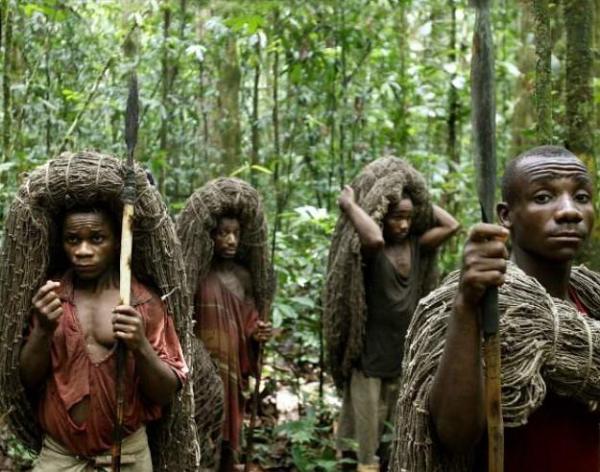Tribes of Africa - Names, Meanings and Customs


The tribes of Africa are so diverse, we do not even know how many of them there are. This is because of various factors including the lack of ability to chart their often very fast population growth. The traditions, dress, music and other tribal customs are very particular to the African continent, but within these tribes is a great range of diversity. Tribal living tends to be much more closely related to their ecosystems. They take natural materials from their environment and turn them into all kinds of tools and clothing, as well as constructions and crafts. A clear example of their crafts are the magical and enigmatic masks of African tribes. They design and use these masks during dances and representations of their religious beliefs.
If you want to know more about the interesting world of African tribes, continue reading this thedailyECO article provides 16 tribes of Africa with their names, meanings and customs. We also provide photos.
African tribe names
African ethnic groups are some of the greatest cultural riches in the world. Next, we provide a list with the names of the best-known African tribes. We also look at some of the lesser known tribes which are so due to population size or remoteness of their location:
- Bushmen: Botswana, Namibia, South Africa and Angola.
- Hamer: Ethiopia.
- Himba: Namibia.
- Daasanach: Ethiopia, Kenya and Sudan.
- Dinka: Sudan.
- Karo: Etipoía.
- Masai: Kenya and Tanzania.
- Mursi: Ethiopia.
- Nyangatom: Ethiopia.
- Nuba: Sudan.
- Pygmy: Congo.
- Samburu: Kenya.
- Surma: Ethiopia.
- Tuareg: Algeria, Libya, Niger, Mali, Morocco and Burkina Faso.
- Turkana: Kenya and Sudan.
- Zulu: South Africa, Mozambique, Zambia and Zimbabwe.
In the next sections we will see in detail the traditions of the best-known African tribes .
Bushmen
In the amazing Kalahari desert, the famous Bushmen tribe has inhabited and developed its culture for millions of years. Also known as the San people, they are considered one of the oldest cultures on Earth. The meaning of their tribe's name is ‘man of the forests’. It refers to their ability as hunters and gatherers, dedicating themselves mainly to the harvest of plants and fruit trees that grow in the region.
This famous tribe is known worldwide for its distinct communication through clicks made with the mouth. This is their only type of language. They are characterized by being a peaceful and generous people, in which the hierarchy of its tribe lacks a chief. Their main objective is to maintain the general well-being of the tribe, sharing its possessions and making equitable use of its resources.
Today, the Bushmen's area of occupation has been severely reduced compared to previous centuries. This is mainly due to pressure from the Botswana Government, which is responsible for the expulsion of Bushmen from the Central Kalahari Game Reserve.

Himba
In northern Namibia, the Himba African tribe is easily recognizable due to the characteristic reddish color of their skin, as you can see in the photo below. This custom of painting and decorating their bodies is one of the main traditions of African tribes. In the case of the Himba, they prepare a mixture like a cream with ocher, natural herbs from the region and butter. The result serves to keep the skin clean and to be protected from strong solar radiation.
The meaning of Himba is ‘beggar’ and refers to their humble lifestyle. They currently maintain the same customs and trade as cattle breeders that they have been developing for thousands of years.

Daasanach
This African tribe is famous for its original and artistic decorations made with recycled materials. The Daasanach are a large tribe in which exiles from numerous and different neighboring Ethiopian tribes live. They inhabit the Omo River Valley and Lake Turkana, both declared World Heritage Sites. The meaning of their tribe's name is ‘people of the delta’ which reflects the location close to the river delta and surrounding areas.
The Daasanach dedicate themselves mainly to agriculture. One of their most notable traditions is the making of decorations and beads for their hair and clothing with materials they find discarded in the area where they live. This is often in the form of sheet metal and other metallic materials.

Masai
The Masai are perhaps the best known tribe in East Africa. They fill the areas of Kenya and Tanzania where they live with life using their dances and colorful clothing. An estimated 883,000 individuals of this famous African tribe live in the region.
In the Maa language used by the Masai, the name of their tribe acquires a curious meaning: ‘I don't want to ask’. Perhaps it is linked to their natural and harmonious lifestyle, in which the resources of nature serve as sustenance to build their houses, red clothes and leafy beads. With cow dung, mud and straw, the Masai build their houses in villages and are mainly dedicated to grazing animals.
Among their main traditions are the importance of the people of the tribe based on the number of cows and children they have. They are known their energetic war dances in circles which involve some of the highest jumps made by people, without leaning on poles or similar tools. This is undoubtedly one of the best known African tribal dances worldwide. In the photo below, you can see this dance full of jumps. Also, in the cover photo of this article you can see Masai women, also dressed in red tones and full of beads and accessories prepared by the members of the tribe themselves.

Pygmy peoples
Short in stature and dark-skinned, members of the Pygmy ethnic group inhabit different regions of central Africa, known as the Congo region. The name they receive comes from the Greek and means ‘the size of a fist’. This is because adults do not exceed a meter and a half in height .
Among their main customs, their amazing skill as hunters with arrows and nets stands out. Thanks to this ability, they hunt large antelopes, pigs, monkeys and a variety of birds, among other animals. The Pygmies also stand out for their characteristic vocal music which is part of the most striking type of music of the African tribes. They use musical patterns with repetitions and numerous rhythmic figures that make their improvised songs quite a spectacle.

Tuareg
Among the Islamic countries of North Africa, the Tuareg are recognized for their blue clothing. The meaning of the name of the tribe defines them as ‘the free, the noble’, being one of the most abundant and characteristic nomadic peoples of the Sahara.
They live in large family units, moving through the desert with the help of camels and other animals. These animals serve as support and a source of resources for the use of their meat and skins. Among their customs, their dedication to grazing, crafts and trade stand out. They live in tents called ehe and have their own script, the tifnagh.

Zulu
To the south of the African continent, the Zulu tribe venerates the ‘sky or firmament’ to which their name refers in their indigenous language. They are mainly dedicated to livestock and agriculture on the lands of the Republic of South Africa in which they live. They are prone to practice polygamy, with the aim of increasing their pride and happiness. The more children they have, the greater achievements and importance they have within the tribe.
The Zulu are one of the most famous African tribes due to their joyous music and characteristic dances in which they sway frantically to the rhythm of percussion instruments. They do so while wearing their multiple and colorful necklaces which you can see in the photo below.

If you want to read similar articles to Tribes of Africa - Names, Meanings and Customs, we recommend you visit our Indigenous peoples category.
- Wilfried, M. (2015) The cultural dilemma in current African society: approach and contributions of Donato Ndongo -bidyogo. Hispanic Studies Magazine , Volume 2 (1), pp: 119-136.
- Terrades, V. (2015) These are not African masks. Polytechnic University of Valencia , pp:10-16.
- López, A. (2005) The pending revolution: political change in Africa. Editions of the University of Lleida , pp: 107-213.












